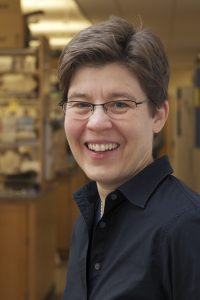We hope you will join us for the 2021 Grace Hopper Distinguished Lecture by Dr. Jennifer Lewis, presented by the Department of Bioengineering. For event links, email ksas@seas.upenn.edu.
Date: Thursday, March 25, 2021
Time: 3:00-4:00 PM EDT

Speaker: Jennifer A. Lewis, Sc.D.
Wyss Professor for Biologically Inspired Engineering
The Wyss Institue
Paulson School of Engineering and Applied Sciences
Harvard University
Title: “Biomanufacturing Vascularized Organoids and Functional Human Tissue”
Following the lecture, join us for a panel discussion “Horizon 2030: Engineering Life & Life in (Bio)Engineering” featuring Dr. Lewis and Penn faculty and moderated by Bioengineering students. Further details here.
Lecture Abstract:
Recent protocols in developmental biology are unlocking the potential for stem cells to undergo differentiation and self-assembly to form “mini-organs”, known as organoids. To bridge the gap from organoid building blocks (OBBs) to therapeutic functional tissues, integrative approaches that combine bottom-up organoid assembly with top-down bioprinting are needed. While it is difficult, if not impossible, to imagine how either organoids or bioprinting alone would fully replicate the complex multiscale features required for organ-specific function – their combination may provide an enabling foundation for de novo tissue manufacturing. My talk will begin by describing our recent efforts to generate organoids in vitro with perfusable microvascular networks that support their viability and maturation. Next, I will describe the generation of 3D vascularized organ-specific tissues by assembling OBBs into a living matrix that supports the embedded printing of macro-vessels by a process known as sacrificial writing in functional tissue (SWIFT). Though broadly applicable, I will highlight our recent work on kidney, cerebral, and cardiac tissue engineering.
Dr. Lewis Bio:
Jennifer A. Lewis is the Jianming Yu Professor of Arts and Sciences, the Wyss Professor for Biologically Inspired Engineering in the Paulson School of Engineering and Applied Sciences, and a core faculty member of the Wyss Institute at Harvard University. Her research focuses on 3D printing of functional, structural, and biological materials that emulate natural systems. Prior to joining Harvard, Lewis was a faculty member in the Materials Science and Engineering Department at the University of Illinois at Urbana-Champaign, where she served as the Director of the Materials Research Laboratory. Currently, she directs the Harvard Materials Research Science and Engineering Center (MRSEC) and serves the NSF Mathematical and Physical Sciences Advisory Committee.
Lewis has received numerous awards, including the Presidential Faculty Fellow Award, the American Chemical Society Langmuir Lecture Award, the Materials Research Society Medal Award, the American Ceramic Society Sosman and Roy Lecture Awards, and the Lush Science Prize. She is an elected member of the National Academy of Sciences, National Academy of Engineering, National Academy of Inventors, and the American Academy of Arts and Sciences. Her research has enjoyed broad coverage in the popular media. To date, she has co-founded two companies, Voxel8 Inc. and Electroninks, that are commercializing technology from her lab.
Information on the Grace Hopper Lecture:
In support of its educational mission of promoting the role of all engineers in society, the School of Engineering and Applied Science presents the Grace Hopper Lecture Series. This series is intended to serve the dual purpose of recognizing successful women in engineering and of inspiring students to achieve at the highest level.
Rear Admiral Grace Hopper was a mathematician, computer scientist, systems designer and the inventor of the compiler. Her outstanding contributions to computer science benefited academia, industry and the military. In 1928 she graduated from Vassar College with a B.A. in mathematics and physics and joined the Vassar faculty. While an instructor, she continued her studies in mathematics at Yale University where she earned an M.A. in 1930 and a Ph.D. in 1934. Grace Hopper is known worldwide for her work with the first large-scale digital computer, the Navy’s Mark I. In 1949 she joined Philadelphia’s Eckert-Mauchly, founded by the builders of ENIAC, which was building UNIVAC I. Her work on compilers and on making machines understand ordinary language instructions lead ultimately to the development of the business language, COBOL. Grace Hopper served on the faculty of the Moore School for 15 years, and in 1974 received an honorary degree from the University. In support of the accomplishments of women in engineering, each department within the School invites a prominent speaker for a one or two-day visit that incorporates a public lecture, various mini-talks and opportunities to interact with undergraduate and graduate students and faculty.
